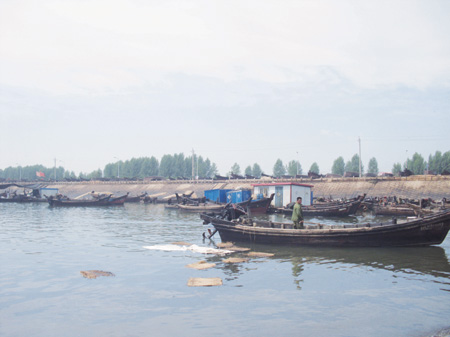Dirty business: To clean up the oil
While the China National Petroleum Corporation honored 197 employees for their rescue and disaster relief work after two oil pipelines in Dalian, Liaoning Province, exploded on July 16, fisherman Gao Shengbao was desperately searching the oil-slick sea for his nephew, Cui Zhanyou, who drowned while working on the cleanup.
 |
|
The Jinwan Bridge harbor. |
"We planned to earn some money by cleaning up the oil, not to lose our lives," Gao, in his 40s, told the Global Times. Wearing oil-stained camouflage clothes, Gao, from Miaoshang village, was tanned with a tattoo in Chinese characters reading "bravery" on his lower arm.
In a response to the Dalian city government's call for fishermen to help the with the cleanup, 14 men from Gao's family set sail on July 23. Four days later, Cui disappeared and to date his body has not been found.
Thirty-six-year-old Cui is also the only government-confirmed death among an estimated 200,000 fishermen who joined the cleanup effort. More than 7,080 fishing boats joined the battle against the oil spill beginning July 19, according to official statistics. Most of them are from Golden Pebble Beach, a national resort and aquaculture farming area.
Greenpeace hailed the fishermen for "creating a miracle with straw mats and their bare hands," in a report that added, "they've collected 60,000 tons of oil with 200,000 fishermen."
Even though it was effective, experts also said the barehanded method of cleaning up oil was "at high cost to the safety and health of the cleanup workers."
Cui's death
According to the Xinhua News Agency, the oil slick covered more than 183 square kilometers of water.
After the local government promised to pay 300 yuan ($44) for a 50-kilogram barrel of oil, Gao's family joined the cleanup team.
On July 27, Cui, Gao and a third man surnamed Huang set sail on the same boat as usual to collect oil. Four hours later, they had filled 23 barrels with oil and were heading back to port.
Suddenly, a wave swamped and turned over the boat.
Gao held tightly the bow and kept afloat for four hours until rescuers from the local government saved him and Huang.
"My whole body was covered with oil when I was rescued," Gao said. He was carried to a bathhouse to wash off the oil. However, Cui had disappeared.
Gao insisted that the oil partly caused the death of his nephew. "I think my nephew might have been able to survive if there wasn't thick oil in the sea," Gao said. According to Gao, Cui was an excellent swimmer.
The second day after Cui's disappearance, Gao and his relatives rented a speedboat to search the waters and coastline daily around Golden Pebble Beach. They barely talked to each other as they searched.
Gao always sat at the bow, smoking a cigarette, and staring into the sea without a rest."I wish I had eyes that can see 1,000 miles away, so that I could get my nephew back soon," Gao said.
Although their search efforts have cost them 20,000 yuan in three weeks, Cui's family and relatives said they would press on.
"Even if I had to borrow money, I will never give up trying to find my husband," said Cui's wife, Liang Shuangying.
Liang said Cui did not say goodbye to her and their 11-year-old daughter before he went to sea that day.
"He left while we were still asleep, so it's a pity we didn't see his face for the last time," Liang said, bursting into tears and holding her daughter tightly.
Gao declined to say how much money he and Cui made during his short time cleaning up the oil. "We had no time to count it. We just want to find the body."
The family does hope the government can help shoulder part of the expense. "After all, we helped the government with the cleanup," Gao said.
A female official from the Dalian Manjiatan township government that administrates Miaoshang village told the Global Times "the government can do nothing to help," because Cui was not a local resident.
They are a typical fishermen family that migrated from Heilongjiang Province to Dalian in the late 1980s.
 0
0 







Go to Forum >>0 Comments